Subscribe for Updates
Restart with Relationships: For Most Minnesota Youth, Strong Youth-Adult Relationships Weren’t Present Even Before the Pandemic
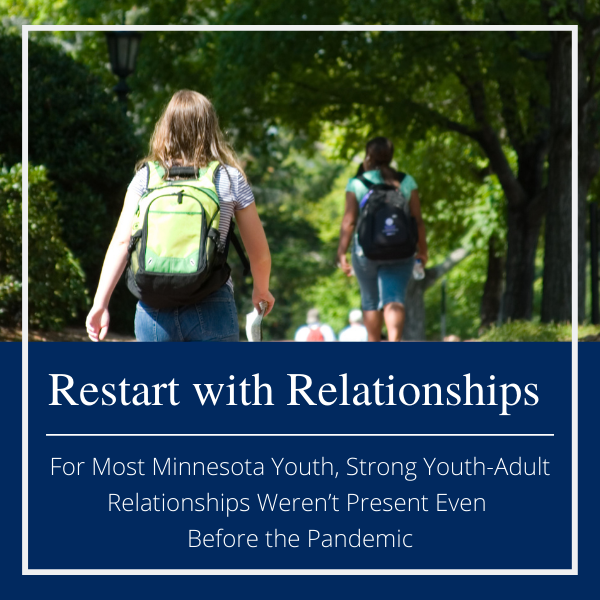
By Ashley Boat, Research Scientist, Search Institute
After months of distance learning, many Minnesota students are transitioning back to in-person learning this month. These students are returning to the classroom with the weight of the COVID-19 pandemic resting heavily on their minds and well-being. The list of stressors is long: the loss of loved ones, parental unemployment, increased food, and housing insecurity, falling behind in school, and feelings of loneliness, anxiety, and frustration…to name a few. Positive relationships are critical to navigating these challenges, and yet they have never been more challenging to build.
As classrooms transition back to in-person learning, now may be an especially important time to understand ways that adults can foster positive relationships with young people. We know that all youth need positive relationships to grow and thrive, yet even before the pandemic, only a minority of Minnesota youth reported having strong relationships with adults in school or other places beyond the home. That means that the challenge is not just to rebuild relationships that have been strained by the pandemic but investing in deepening relationships that young people didn’t experience before this nation and state faced this crisis.
This is one conclusion of a new report that Search Institute has released as a first step in a systematic study sponsored by the Carlson Family Foundation that seeks to understand the degree to which schools and out-of-school time (OST) programs across an entire state are focused on, and invest in, youth-adult relationships. This report includes information about Minnesota schools and OST programs’ investments in young people’s relationships and a summary of existing Minnesota-specific and relationships-focused data. These were collected prior to the COVID-19 pandemic, drawing heavily on the Minnesota Student Survey (Sample = 107,128 students; grades 5, 8, 9, and 11) and Search Institute’s Developmental Relationships Survey (Sample = 5,373 youth; grades 4-12).
Five key findings emerged:
- Most Minnesota youth reported having positive relationships with parenting adults. When asked on the Minnesota Student Survey, what adults young people could go to to talk about a problem, over 80% of young people reported they could go to a parent/guardian.
- Few Minnesota youth reported having other adults (e.g., teachers, adults in their community) in their lives that they can go to to talk about a problem. When asked on the Minnesota Student Survey, what adults young people could go to to talk about a problem, far fewer felt that they could go to an adult at school (28% – 44%) or some other adult (16% – 34%). In fact, on average across grades, almost 10% of Minnesota youth reported that they have no adults that they could go to when they have a problem.
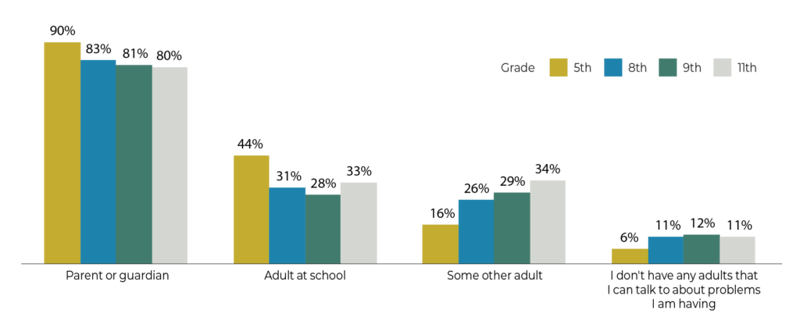
- Roughly half of Minnesota youth reported having positive relationships with teachers and other adults in their community. Most Minnesota youth felt positive about their school climate. Students agreed that teachers and adults at their school generally cared about students, listened to students, and treated students fairly. Yet, when Minnesota youth were asked how much their teacher or other adults in their school cared about them, just over half of Minnesota youth (52%) agree quite a bit or very much. The Developmental Relationships Survey found similar results with just 42% of MN youth saying they have strong developmental relationships with teachers or OST staff. See more graphs on pp.19-21 of the report.
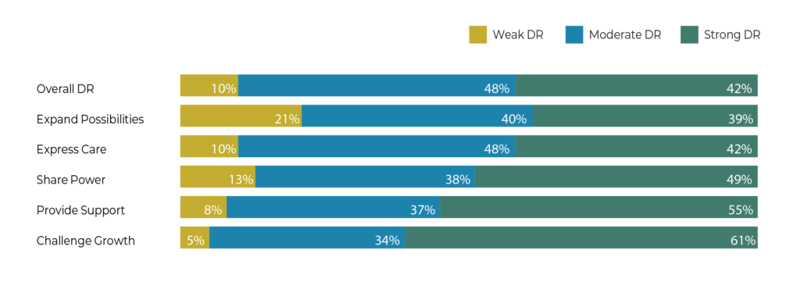
- Young people’s experiences of relationships with the adults in their lives varied by youth race/ethnicity, socioeconomic background, and geographic location. Findings from both the Minnesota Student Survey and the Developmental Relationships Survey found that not all young people have access to and experience positive relationships equitably. Youth-adult relationships look different across different settings (e.g., school, family, OST), geography (e.g., rural vs. urban), and identities (e.g., race/ethnicity, socioeconomic status). See more graphs on pp. 22-26 of the report.
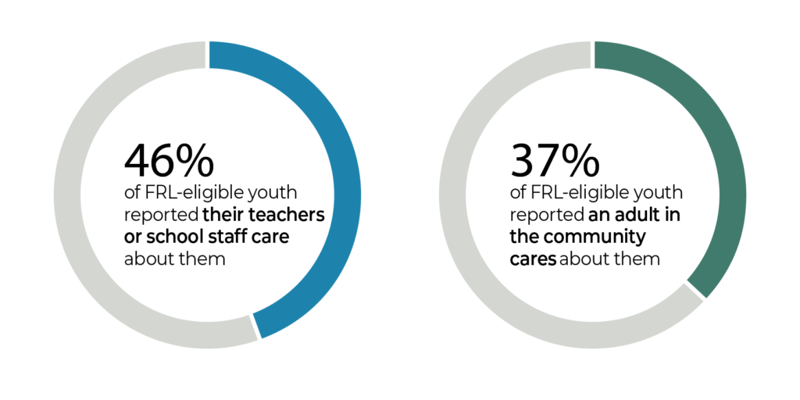
- Young people and teachers/program staff perceived their relationships with each other differently. The Developmental Relationships Survey included both a youth and teacher/program staff survey. Teachers and program staff overwhelmingly reported engaging in relationship-building behaviors more than youth reported experiencing them.
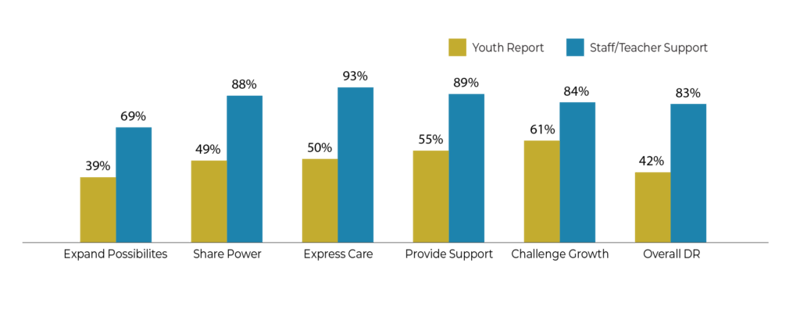
These findings show that even prior to the pandemic, many young people across Minnesota were missing important positive relationships in their lives. Sometimes the hardest patterns to break are things that we’ve always done. The pandemic disrupted those deeply ingrained patterns. Schools and programs have an opening in the midst of this difficult disruption to restart with relationships in more intentional and inclusive ways that they had been doing before.
This will require commitment, focus, and investment at all levels, from individual teachers and staff to principals and executive directors to superintendents to state and national leaders and policymakers. But if we collectively take advantage of this challenging time to invest in developmental relationships, it could be the most important investment we make in the learning, growth, and thriving of Minnesota’s youth.
With support from the Carlson Family Foundation, Search Institute will build upon these initial findings by partnering with schools and OST programs across the state to understand how they’re centering relationship-building in their work with young people. This study known as Cultivating Connections, will further identify ways Minnesota schools and OST programs can intentionally invest in young people’s relationships and unpack challenges and barriers that schools and OST programs face when building positive relationships with young people. The Cultivating Connections study will be our first step during this important transition to ensuring that all Minnesota youth have equitable access to high-quality youth-adult relationships.
* Thanks to my colleagues Amy Syvertsen, Ph.D., Gene Roehlkepartain, Ph.D., and Kent Pekel, Ed.D. for their thoughtful comments and contributions to this blog.
Search Institute
3001 Broadway Street NE #310
Minneapolis, MN 55413
© 2021 Search Institute |
Search Institute is a 501(c)(3) nonprofit charitable corporation. All contributions are tax deductible.
